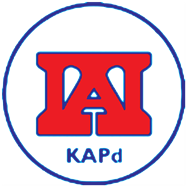Factors That Detect Fraud Accounting With Time Pressure As Moderation in Educational Units in Indonesia
DOI:
https://doi.org/10.26740/akunesa.v14n01.p155-165Keywords:
Conformity Compensation, Culture Organization, Effectiveness Internal Control, Fraud Accounting, Morality Individual, Time PressureAbstract
Fraud in the field accountancy is actions taken Because existence intention or desire For get profit from circumstances , which then result in occurrence manipulation in report finance , as well as practice corruption or abuse assets . The meaning of studies This is evaluate elements that provide impact on fraud accountancy with pressure time as moderating factors in institutions education in Indonesia. Approach quantitative implemented as method research , while method survey utilized as method For take sample . Data collected with Distributed 120 questionnaires . Data analysis used the SmartPls program . According to results testing that has been implemented , researchers identify that strength system internal control and values organization influence action cheating accounting . On the other hand , the balance reward as well as personal ethics own effect against accounting fraud . Furthermore results other show that pressure time No can moderate variables suitability compensation , ethics personal , efficiency system control , institutional culture to deviation reporting . Based on assessment R2 value , Compensation influence occurrence fraud accounting , ethics individual , effectiveness internal control , as well as culture organization , with pressure time play a role as moderator variables that provide contribution of 21.7%. While 78.3% of the influence from contribution outside .
References
Agustiawan, A., Ririn Melati, & Siti Rodiah. (2022). Pengaruh Budaya Organisasi, Proactive Fraud Audit, Whistleblowing, Dan Pengendalian Internal Terhadap Pencegahan Kecurangan Dalam Pengelolaan Dana Bos. Accounting and Management Journal, 6(1), 17–25. https://doi.org/10.33086/amj.v6i1.2378
Ayu Eva Yanti, A. A., Muliati, N. K., & Yuliantari, N. P. Y. (2023). Pengaruh Tekanan Finansial, Budaya Organisasi, Dan Pengendalian Internal Terhadap Kecenderungan Kecurangan. Hita Akuntansi Dan Keuangan, 4(2), 248–260. https://doi.org/10.32795/hak.v4i2.3524
Djuniar, L., Betri, B., Mayora, E., & Anggel, A. A. (2021). Asimetri Informasi Kompetensi Dan Moralitas Individu Terhadap Kecenderungan Kecurangan Akuntansi Dengan Perilaku Tidak Etis Sebagai Variabel Moderasi. Jurnal Ilmiah Akuntansi Dan Bisnis, 6(2), 115–134. https://doi.org/10.38043/jiab.v6i2.3258
Farasila, R., & Riyanto, A. (2022). Pengaruh Good Corporate Governance, Pengendalian Internal Dan Budaya Organisasi Terhadap Pencegahan Fraud Pada Pt Bpd Kaltim Kaltara Cabang Nunukan. OBOR: Oikonomia Borneo, 4(2), 102–117. https://doi.org/10.24903/obor.v4i2.1735
Febrianti, A., & Kusmawati, K. (2022). Pengaruh Sistem Pengendalian Internal Dan Asimetri Informasi Terhadap Kecenderungan Kecurangan Akuntansi. Jurnal Informasi Akuntansi (JIA), 1(2). https://doi.org/10.32524/jia.v1i2.542
ICW. (2024). Laporan Hasil Pemantauan Tren Korupsi Tahun 2023.
Jackson, C. W. (2015). Detecting accounting fraud : analysis and ethics.
Kurrohman, T., Lailiyah, A., & Wahyuni, N. I. (2017). Determinant of fraudulent in government: An empirical analysis in Situbondo Regency, East Java, Indonesia. International Journal of Economics and Management, 11(SpecialIssue1), 133–140.
Mappadang, A. (2022). Motivation Of Fraud: Internal Control System, Organizational Justice, Compensation, And Information Asymmetry. Jurnal Akademi Akuntansi, 5(1), 135–148. https://doi.org/10.22219/jaa.v5i1.19677
Masni, E. P., & Sari, V. F. (2023). Pengaruh Akuntabilitas, Kesesuaian Kompensasi, Pengendalian Internal, dan Budaya Organisasi terhadap Kecurangan Dana Desa. Jurnal Eksplorasi Akuntansi, 5(1), 263–277. https://doi.org/10.24036/jea.v5i1.729
Najib, M. I. A., & Suryandari, D. (2017). The Influence of Experience and Time Budget Pressure on Audit Quality with Compensation As Moderating Variable. Accounting Analysis Journal (AAJ), 6(3), 458–467. http://journal.unnes.ac.id/sju/index.php/aaj
Pramesti, A. R., & Wulanditya, P. (2021). Studi Eksperimen: Moralitas Individu, Kesesuaian Kompensasi, dan Kecenderungan Kecurangan Akuntansi. Jurnal Akuntansi AKUNESA, 9(3), 99–110. https://doi.org/10.26740/akunesa.v9n3.p99-110
Putri, A. A., & Hariani, S. (2021). Determinan Kecenderungan Kecurangan Akuntansi. AKURASI: Jurnal Riset Akuntansi Dan Keuangan, 3(1), 17–28. https://doi.org/10.36407/akurasi.v3i1.225
Singleton, T. W. S. A. J. (2010). Fraud Auditing and Forensic Accounting. In John Wiley & Sons, Inc.: Vol. Fourt Edit (Issue 1).
Soedarsono, A., & Sonhaji, S. (2023). Bagaimana Paket Pengendalian Internal Mencegah Kecurangan Laporan Keuangan? Jurnal Akuntansi Multiparadigma, 14(2), 320–338. https://doi.org/10.21776/ub.jamal.2023.14.2.23
Syahrudin, M., & Susanto, S. (2025). Examining the Moderating Role of Compensation in the Relationship between Morality and Internal Control to Accounting Fraud MSMEs in Indonesia : Figure 1 Overview of Indonesian MSMEs. 2(5), 305–318. https://doi.org/10.62885/ekuisci.v2i5.744
Yamaly, F., & Adelia, D. (2022). Pengaruh Pengendalian Internal , Kesesuaian Kompensasi , Dan Budaya Organisasi. Jurnal Ekonomi Manajemen Akuntansi, 7, 95–108.
Downloads
Published
How to Cite
Issue
Section
 Abstract views: 104
,
Abstract views: 104
, PDF Downloads: 13
PDF Downloads: 13







